What are the best sweeteners for the keto diet? Check out this comprehensive guide to baking with sugar substitutes, and learn how to get the taste and texture you crave!
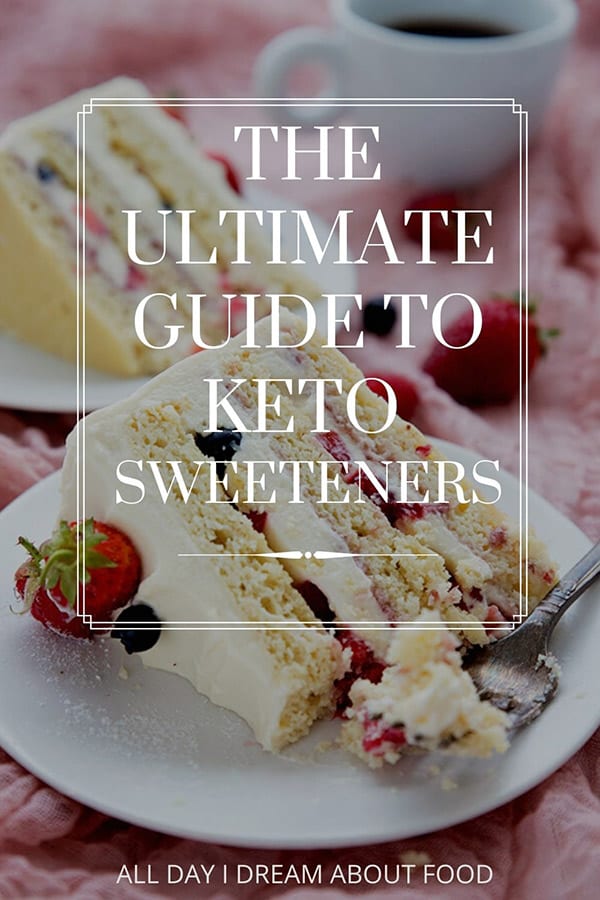
Today, my keto friends, I am imparting some of my vital knowledge and deep wisdom about using keto sweeteners. We will discuss all of their pros and cons, and how they affect the outcome of your keto desserts.
In advance of the holiday baking season, I figured you could put this information to good use. Because if you’re anything like me, you like to get an early jump on your keto holiday cookies!
This is actually an abridged version of the in-depth keto sweetener section in my book, The Ultimate Guide to Keto Baking. I think you will find it very informative.

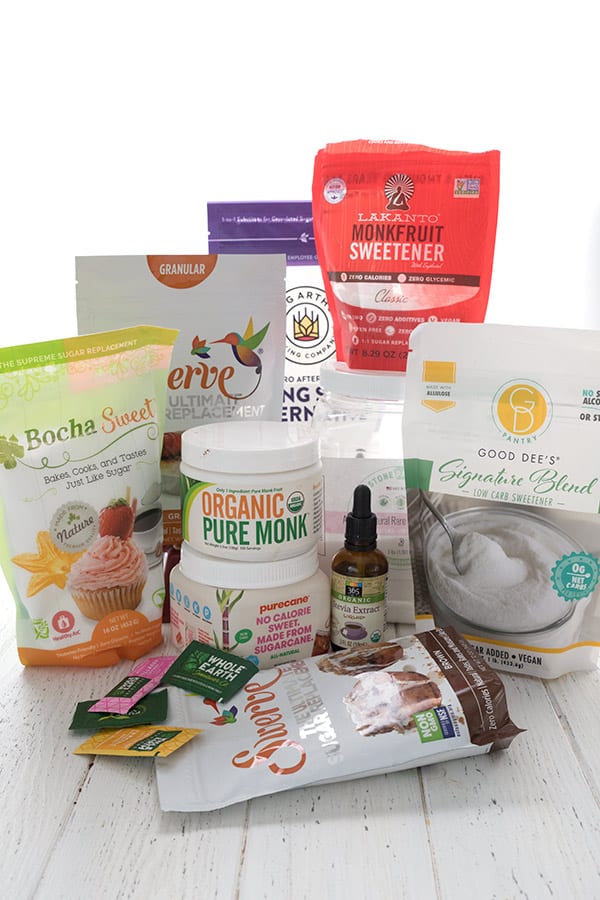
What is the best keto sweetener?
I’m sorry, I simply cannot answer that for you.
I’m not being willful or stubborn, or deliberately withholding information. It’s simply that there is no such thing. Yes, you read that right – there is no such thing as the best keto sweetener.
Here’s why: Everyone experiences these sugar substitutes differently. It’s almost as individual as the individual themselves.
- Some people experience an unpleasant aftertaste with one and not another.
- Some people suffer from GI issues or headaches when consuming certain sweeteners.
- Some people see a blood sugar rise when other people do not.
- Some people may even experience an allergic reaction to certain sweeteners.
With the sugar substitutes market constantly expanding and changing, it’s much more about finding what sweeteners work best FOR YOU.
What are the best sweeteners for keto baking?
Ah, now we’re on to something. This is my territory and one that I have researched extensively. I have experimented with a wide array of sugar substitutes and I can tell you straight up that none of them behaves exactly like sugar.
They all have very different properties and the sweetener(s) you choose will impact the outcome of your recipes. The trick is to understand their different attributes and use them to advantage.
Consider the final product before choosing your sugar substitutes. What are you trying to make? What consistency are you trying to achieve? Do you want it crisp or soft? Chewy or cakey? Should it be gooey or firm?
Most of the popular brands on the market are actually blends of two or more keto sweeteners. For simplicity’s sake, I am going to break them down into their main ingredients.
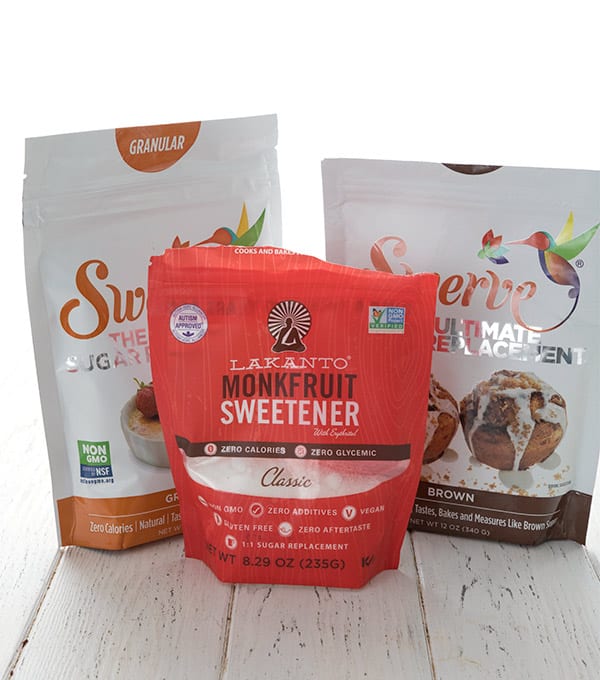
Erythritol
What is it?
Erythritol is a sugar alcohol (polyol) that is naturally present in some fruits and fermented foods. For mass production, it is made by fermenting a glucose syrup with enzymes.
It is unique among sugar alcohols in that it has zero carb impact. Our bodies simply do not recognize it as a carb so it does not impact blood sugar at all. And unlike many sugar alcohols, it does not cause gastrointestinal issues for most people.
How does it work?
Similar to sugar:
– Erythritol mimics sugar in its crystalline structure, so it helps whip air into butter and egg whites.
– It also browns and crisps up nicely and it can even be coaxed into caramelizing.
Differs from sugar:
– It’s only 70% as sweet as sugar, which is why most brands combine it with other sweeteners, to make it measure cup for cup.
– It’s non-hygroscopic, meaning that unlike sugar, it does not attract or hold onto moisture, which can cause baked goods to be dry and crumbly if they don’t have enough fat.
– It can re-crystallize as it cools, particularly in liquid applications like sauces, custards, and ice cream.
– Some people experience a mouth-cooling sensation, similar to sucking on a mint. Not everyone experiences this, and often mixing it with other sweeteners eliminates this sensation.
Major Brand Names: Swerve, Lakanto (this is mostly erythritol… do not be fooled by the fact that it calls itself a “monk fruit sweetener”), So Nourished, ZSweet.

Xylitol
What is it?
Xylitol is also a sugar alcohol found in some fruits and vegetables, as well as in wood and corn. It is usually manufactured commercially from corn or birch trees.
Some, but not all, xylitol is absorbed by the intestines into the bloodstream. This means it can cause some gastrointestinal discomfort when consumed in large amounts. It can also have an impact on blood sugar.
WARNING! The biggest issue with xylitol is that it is highly toxic to dogs.
How does it work?
Similar to sugar:
– It has a crystalline structure so it can whip air bubbles into butter and egg whites. It’s also as sweet as sugar.
– It’s more hygroscopic than erythritol so it attracts moisture and it doesn’t re-crystallize as it cools. Xylitol is great for ice creams and sauces to keep them soft.
Differs from sugar:
– Xylitol doesn’t caramelize or crisp up very well. This can cause problems for baked goods that need a crisp texture, like many keto cookies. They will turn out much more cakey and soft if you use xylitol.
– Definitely do NOT use for meringue, as it will stay gooey and soft, and won’t come off the parchment paper.
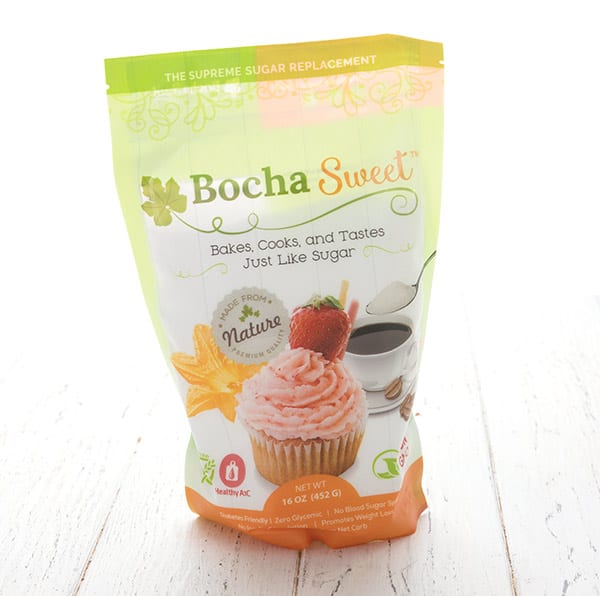
BochaSweet
What is it?
BochaSweet is the brand name of a unique sweetener derived from the kabocha squash, a type of winter squash also know as Japanese pumpkin.
Like erythritol, it seems to have little to no impact on most people’s blood sugar. But like xylitol, it can cause some gastrointestinal upset when consumed in large quantities.
In many ways, BochaSweet functions a lot like xylitol (they are both pentose sweeteners), but it does not appear to be toxic to household pets.
How does it work?
Similar to sugar:
– BochaSweet is as sweet as sugar and so can be used as a cup-for-cup replacement, without an apparent aftertaste.
– It is more hygroscopic and doesn’t re-crystallize so it’s great in sauces, custards, and ice creams. (I have started using it in combination with Swerve in all of my keto ice cream… they stay scoopable even straight from the freezer!).
Differs from sugar:
– Just like xylitol, BochaSweet will not crisp up or brown very well. Cookies end up soft and cakey, and meringues are so gooey that they won’t come off the paper.
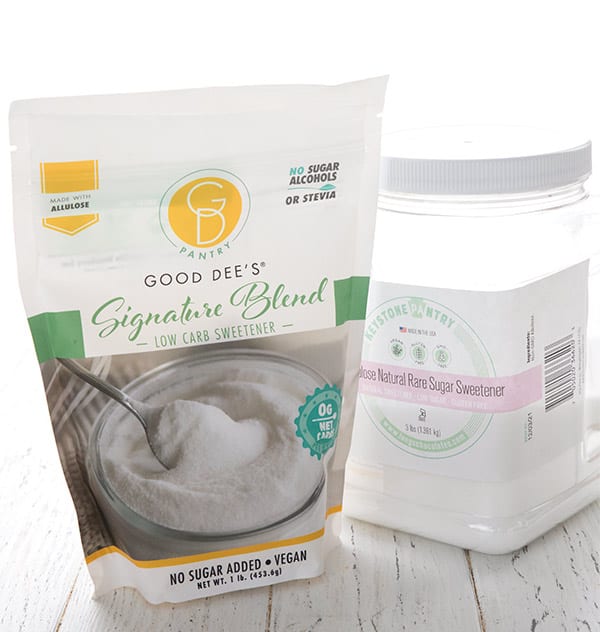
Allulose
What is it?
Allulose is a relative newcomer on the sugar alternative scene and has become incredibly popular. It is a monosaccharide, which means it really is a “sugar”, but one that our bodies don’t treat like a sugar or a carb. It is largely excreted without ever affecting blood glucose levels.
However, I caution you from personal experience that large amounts can cause serious GI distress. Many people don’t seem to suffer from this, but some of us do and it’s…not fun.
So it’s worth testing on yourself in small amounts and building up from there.
How does it work?
Similar to sugar:
– Allulose caramelizes nicely and tends to be hygroscopic, keeping sauces and ice creams soft, and baked goods tender.
Differs from sugar:
– Allulose is only 70% as sweet, which means you need more to sweeten your desserts.
– While it caramelizes well, it doesn’t crisp up well and baked goods tend to be soft and cakey. Even just a little allulose, in combination with other sweeteners, can prevent your cookies from becoming crisp.
– It can over-brown the outside of baked goods, especially the parts that are touching the sides of the pan. Cakes can have a dark, almost burnt appearance, although they aren’t over-cooked.
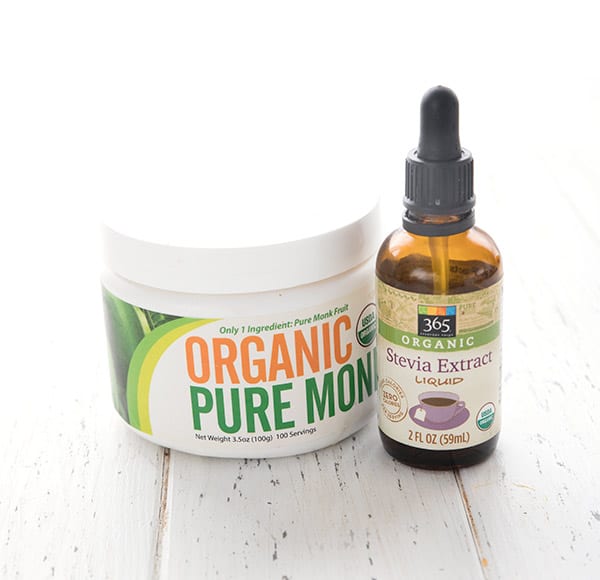
Stevia and Monk Fruit
I am lumping these two together because they have many similar properties and behave much the same way.
What are they?
Both stevia and monkfruit are naturally derived, plant-based sweeteners that are hundreds of times sweeter than sugar. Because they are extremely concentrated, a tiny amount can sweeten a whole recipe.
While that may sound like a good thing, it can have major implications for your keto baked goods. Read on…
How do they work?
Concentrated sweeteners like these have no “bulk” – they have little in the way of weight or volume so they don’t add much to your recipe other than sweetness. They can’t contribute anything to texture or consistency, and they don’t caramelize, crisp, or brown your baked goods.
Bulk is an important factor in anything from cupcakes to frosting. Substituting a non-bulk sweetener means your keto treats may not rise properly, may be more fragile, and may not set properly.
“Monk fruit sweetener”
Please be aware that many brands that bill themselves as “monk fruit sweetener” are actually mostly erythritol. The main ingredient is erythritol, with a little monk fruit to make it sweeter. This means that the sweetener will behave mostly like erythritol.
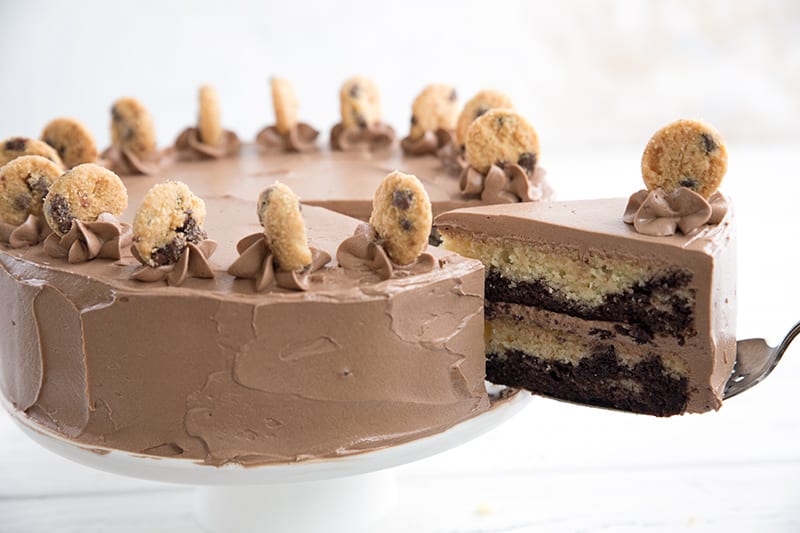
How to use sugar substitutes
I’ve thrown a ton of information at you and I know it’s hard to digest it all. I do this for a living and still I have times when a certain sweetener doesn’t behave the way I think it should. But here’s a quick cheat sheet on what to use when:
Want crisp keto cookies? Use erythritol based sweeteners like Swerve, Lakanto, or So Nourished. Other options will make your cookies soft and cakey. I highly recommend Swerve Brown for the best brown sugar substitute for cookies!
Making a keto cake recipe? Use any sweetener that has bulk (erythritol, BochaSweet, xylitol or allulose), but do be forewarned that some are not quite as sweet as sugar and you may need more of them.
Making a keto frosting? You need a bulk powdered sweetener to give your frosting structure. Erythritol, xylitol, and BochaSweet all have confectioners (powdered) versions. Allulose may as well but I am unsure of brands.
Want a gooey consistency? Try using BochaSweet or allulose, or combine it with another erythritol based sweetener. This combo is perfect for things like keto caramel sauce or my keto pecan pie.
Want keto ice cream that stays scoopable for days? My recommendation is half Swerve and half BochaSweet or allulose. Using only erythritol based sweeteners makes your ice cream rock hard, and all BochaSweet makes it too soft (it stays like soft serve!).
Just trying to sweeten your coffee? Use whatever you like best. They all work well if you don’t need a certain consistency so this is a matter of personal preference.
Still have questions?
Leave a comment and I will do my best to answer!
Adding to the confusion is that many brands on the market are blends of the keto sweeteners I outlined above. Blending sugar substitutes can maximize their sweetness and reduce potential aftertastes.
But I’ve tried such a wide array of sweeteners, I have a good idea of how most of them work. I can also take an educated guess based on the ingredients list. So drop me a line and I will give you all the information I can.

Free Bonus: Secrets to Keto Baking!
Sign up for your favorite recipes delivered straight to your inbox plus get our FREE bonus: Secrets to Keto Baking!




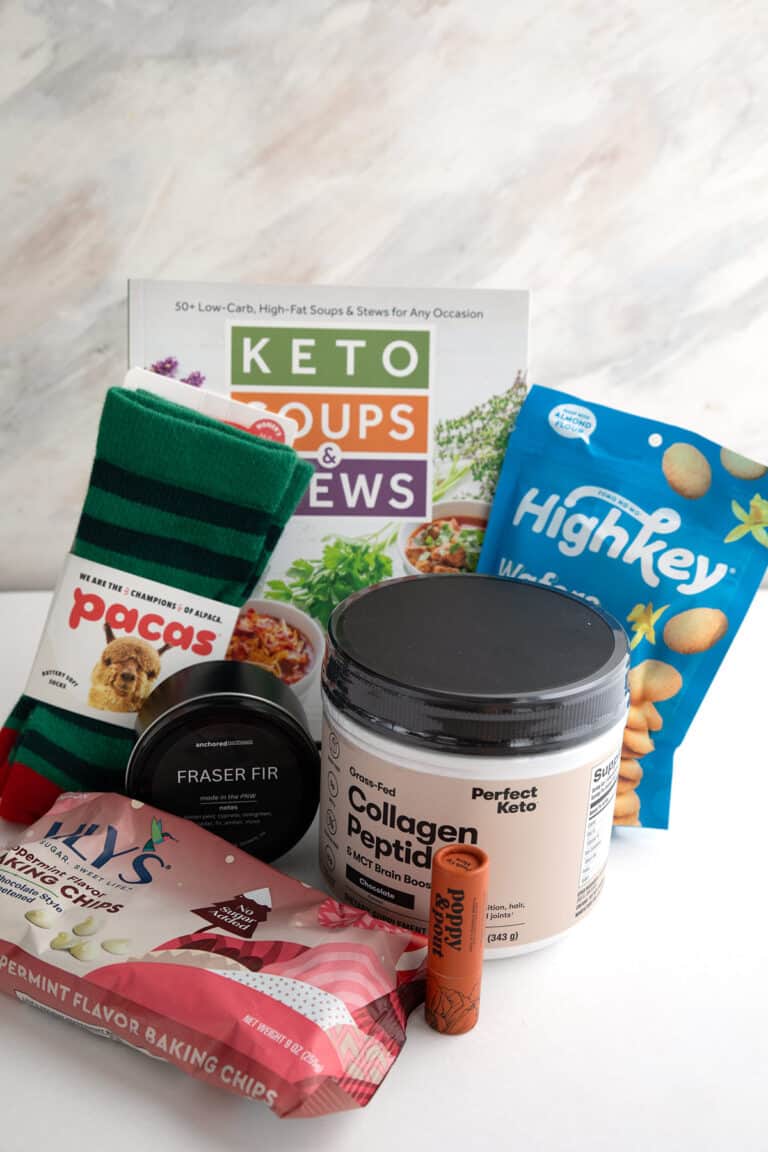
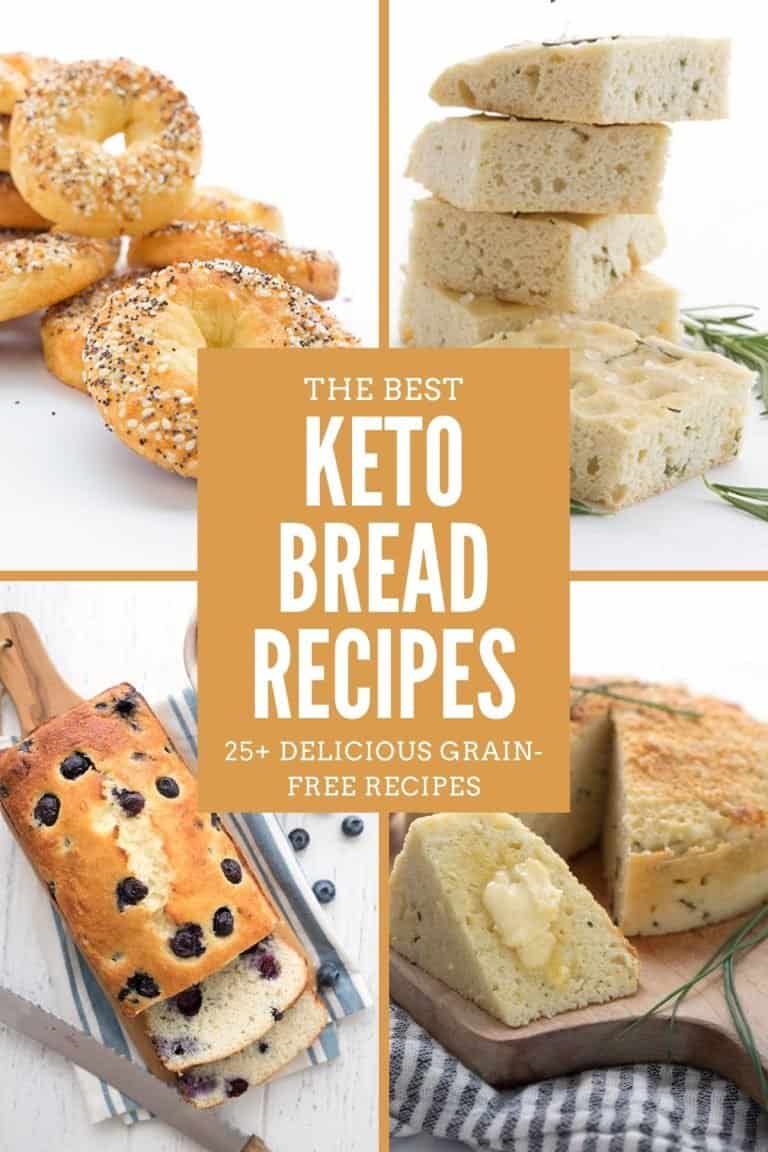









This is absolutely fantastic– THANK YOU SO MUCH!!– and I’ve been using it as my guide since you first posted it. Do you have any recommendations for liquid sugar-free sweeteners to replace maple syrup? I’ve searched through your blog and found a few references for pancake/waffle toppings but it’s pretty pricy to use for more than an extra-special occasion, and definitely for actual baking. I used to use Joseph’s sugar-free maple syrup (which tasted better than the real thing), but the maltitol tore up my guts and they changed the formula anyway so now it’s nasty. Every homemade recipe I’ve tried has been pretty gross too so I’m eager to hear your suggestions! Or better yet, a homemade version that isn’t completely vile 🙂
Which sweetener would work best for the topping on Crème Brule?
Swerve works the best because it’s the only one that hardens as it cools. It’s tough to get it to caramelize properly but it does work!
What about using sucralose in recipes?
I don’t use it, sorry. It’s a man-made chemical and it really doesn’t bake very well.
This is such helpful information, Carolyn, thank you! I am curious about the FOS sweeteners such as Just Like Sugar. I have found they make nice crisp cookies and they seem to not have the weird aftertaste (to me!) when used to dust baked goods (as in cinnamon “sugar.”) Do you have any experience with them as far as cakes and other baked goods go?
Hello Carolyn,
Thanks for all this information! Questions:
1) Can Allulose be substituted in your recipes calling for Bocha Sweet, except for adding more?
2) Have you tried the PureCane at all? Can you add any comments about it? Is it a Bocha Sweet sub?
Allulose is fine as a sub for BochaSweet. I don’t think PureCane is a good sub, and I don’t think it bakes very well. I tried it once in some cookies and they didn’t spread or rise and came out pretty rock hard. If anything, it’s more of a sub for erythritol but even then, I don’t think it’s great.
Can you make your own powder sweetner using a coffee grinder.
You will never get it as fine as a commercial brand and will feel some residual grittiness.
Thank you so much for this information. Checking my pantry, I believe I have just about all of these! And my granddaughter is studying to be a pastry chef and I will pass this info on to her so she doesn’t have so many experiments.
what IS the best for meringue?
I just answered that for someone else, so please read th comments.
Love it ! Thank you so much for your articles 🙂
What’s the best sweetener for meringues that are crunchy outside and softer inside? What about for meringue toppings for pies?
The ONLY sweetener that works for meringues is erythritol – even the littlest bit of BochaSweet or allulose will make them too soft to get off the pan (trust me, I tried… even one tablespoon made them soft as marshmallows). The trick to getting it softer on the inside is not to overbake them.
Make a wonderful dark chocolate custard ice cream using xylitol use 2 eggs beaten Two heaping tablespoons xylitol and two cups heavy cream , 3 tablespoons dark cocoa , heat till thick and blended add pinch salt and a two teaspoon vanilla then run in ice cream maker
this is a valuable lesson on sweeteners. Here I was thinking Lakanto was pure monkfruit….silly me. Thanks for the education. It will help me get those crispy Christmas treats for my family this year.!
Oh my goodness this is so helpful I love it. And thank you for pointing out the xylitol is poisonous to dogs I spent $2000 saving my dog from eating Gumm that was sweet and with xylitol.
This was very informative. Thank you so much!
Sandy
So … a friend gave me a package of MONK FRUIT. I’m a diabetic. What should I use this for? Thanks!
Is it PURE monk fruit or a “monk fruit sweetener”, which is usually mixed with erythritol?
I have been on the search for one that will make meringue
Cookies and so far I have had no luck. Is there one you would recommend for chewy but crisp meringue cookies?
Thank you
Marsha
Only erythritol crisps up enough to make meringue. https://alldayidreamaboutfood.com/low-carb-chocolate-peppermint-meringues/
Can you please tell what is the best sweetener for chutney making
Jams, jellies and chutneys are going to require at least some allulose or BochaSweet to not recrystallize.
Can
Can I use this for canning as well
Hi Carolyn, thank you for all your recipes and information. I am keen to make your Swiss meringue buttercream but I cannot get Swerve or Bocha Sweet in Australia. I can get a monkfruit/erythritol sweetener that I have used before and works well. Can I use just that in the 1/2 + 1/3 amounts listed in your recipe? Thanks again ????
I really feel like you need another sweetener to make sure it doesn’t recrystallize. Anything with erythritol to sub for the Bocha or allulose isn’t going to work. Can you get xylitol?
Hi Carolyn, thank you for all your recipe and information about Keto baking!!
Happened to me that I use erythritol in baking cookies (American style) and brownies but always end it up with a crystallized felling in mouth. Seems like the sweetener never melt or if it does recrystallized after baking. Can be the amount of it? May be is too much? Or maybe the brand
As a reference in may last cookies recipe I used 126g of erythritol and 216g of almond flour, 2 eggs and 55g of butter.
Also the recipe call for cornstarch, cacao (I’m trying this for gluten free more than keto)
Hope you can help me 🙂
Honestly, it’s probably the brand of erythritol you are using.
Hi Claudia, you can also use an erythritol powdered form, you can do it yourself in an coffee grinder or buy it that way. It helps in disolving the crystals. Hope that helps!
Maybe you can get some xylitol and mix them in your recipe?
Is there a good substitute for Swerve?
I have almost every other sugar substitute but have to import swerve at great cost?
Regards
Diana
New Zealand
Any good erythritol based sweetener.